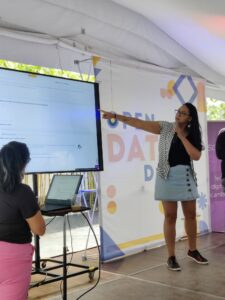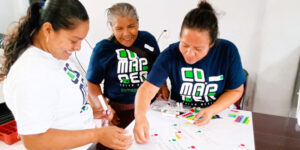Transparency and open data are intimately related to quality journalism. A story will have more credibility if it provides well-analyzed open data. That is why every year, in early March, civic hackers, designers, and journalists, among others, celebrate Open Data Day.
The Mexican organization Social Tic takes this celebration very seriously and holds an annual "big open data party" in Mexico City, where workshops, discussion tables, hackathons and project presentations are held. All with the intention of sharing "knowledge and experiences with dozens of enthusiasts of the use and openness of data."
According to the Economic Commission for Latin America and the Caribbean, the idea of open data is that data should be freely available to all in "terms of being able to access, use and republish such data, without restrictions of copyright, patents or other control or ownership mechanisms." In addition, any public sector information made available as open data is referred to as "Open Government."
LatAm Journalism Review (LJR) compiled data-driven projects presented at this year's Social Tic event and talked to some of their creators about the journalistic benefits of open data.

Claudia Ocaranza, co-founder of pidala.info, one of the data-driven projects presented at the Social Tic Open Data Day celebration. Photo: Courtesy.
"The goal with our project is for citizens to ask more and ask better, transparency is a symbol of democracy...We believe we can help empower journalists' investigations, their stories, by allowing them to access information through an improved process," Claudia Ocaranza, co-founder of pidala.info, one of the data projects presented, told LJR.
According to its website, Causa Natura is a Mexican think tank that aspires to be one of Latin America's benchmark centers for research, dialogue and advocacy for good governance of natural resources.
Causa Natura presented its work on tracking fishing efforts in Mexico and detecting illegalities through satellite signals. "We started to open data from the Pescando Datos [Fishing data] initiative in 2019. The goal is to make useful information available to the interested public through a simple, alternative and independent tool for consulting open governmental data (DAG, by its Spanish acronym) on fishing in Mexico," Sara Chávez, coordinator of the Data Unit of Causa Natura, told LJR.
All data on illegal fishing investigations and others are shared in their data warehouse.
"In Pescando Datos we focused on fishery policy issues. During the first two years, we realized how useful it was to open up information for different audiences, including journalists. Based on this initiative, we decided to broaden our scope in opening data and decided to build a data warehouse within Causa Natura, so there would be information not only on fishing policy but also on other agendas that we work on, from research to journalism," Chávez said.
The organization Data Cívica [Civic data], with researchers from the Program for the Study of Violence of the Center for Economic Research and Teaching (CIDE), created the platform Votar entre balas (Voting between bullets). They document the electoral violence that has become a tool of organized crime in Mexico to influence the public life of states and municipalities.
"Criminal-electoral violence refers to any organized act or threat by criminal organizations that takes place during an electoral process to intimidate, physically harm, frighten, or eliminate a political actor," explains Data Civica in their research methodology section.
To build the databases, an automated search was performed on Twitter and Google scrapping was done in order to identify news with information on electoral violence incidents. Subsequently, a manual reading and systematization of each note was made to capture only relevant cases for the analysis.
All collected data and reports can be downloaded from their website.
Rubén García presents an alternative approach to data visualizations the public is used to.
García presented a data sonification project in which he converts abstract information into sounds to provide, in his words, an auditory experience and a more intuitive understanding of the data. "While most people are visual, we are also very much related to audio and music can evoke a feeling of sensitivity," García said in his presentation during the Social Tic event.
García used the April 2020 dataset of calls to a women's hotline, a telephone service for guidance, counseling and support for women experiencing violence in Mexico, but instead of making a visual report, he transformed the data into music. In this way, he made a representation of the wait a woman experiences when she calls this line.
The team at the Digital Agency for Public Innovation, in charge of implementing data management and open government policies in Mexico City, presented new public databases and visualization tools within the Mexican capital's open data portal.
Some of this new data corresponds to vital records and allows us to know how many people were born in the city, what names they have, which are the most frequent, etc.
El Dato Mx is a work-in-progress created by Diego Plata, who single-handedly seeks to make analysis and write news backed with data and evidence.
So far, it has a website that includes sports and political information. It also has a Twitter account, where he has shared visualizations on the flow of the Mexico City subway and maps on population density.

The collaborative mapping team Comapper showed the work they do in Tulum, Mexico. Photo: Courtesy.
Comapper is a humanitarian, collaborative mapping project that seeks to reduce risks associated with urban growth in Tulum, Mexico.
As Comapper explains on its website, collective or collaborative mapping is a "participatory tool that allows us to reflect on shared space. As with any map, it does not claim to be a faithful or an exhaustive representation of reality. It is a practice in which participants can identify problems beyond those visible to each person. It provides elements to develop a diagnosis of a space and makes visible collaborative networks. It is a place to share experiences, socialize and find community-wide solutions.”
Anyone can participate by helping to map or by joining the field brigades in Tulum.
Social Tic also took the opportunity to present: Femicides in Mexico, between silence and indignation: Analysis of headlines in digital media and reactions in social media. In this work, they analyzed headlines in digital and social media about femicides in Mexico.
The goal was to identify femicide cases that had greater coverage on social media and in news outlets, to identify which cases intensified the conversation and to find out whether social media and headlines were in line with the cases most often mentioned.
Pidala.info is a project that seeks to facilitate access to public information throughout Latin America. For starters, they created a Chrome extension that works on the National Transparency Platform of Mexico, allowing for massive requests (more than 33 at the same time) and having a request summary.
"The idea came from the needs and observations of the members of the team. We are journalists and developers with extensive experience in developing civic technology. On several occasions, we saw our journalistic investigations curtailed because the process of entering a large number of necessary information requests became cumbersome and titanic," Ocaranza said. "Talking with other journalists, we saw that this was a common problem. Finding a solution to that concern was the basis for what years later would become pidala.info."